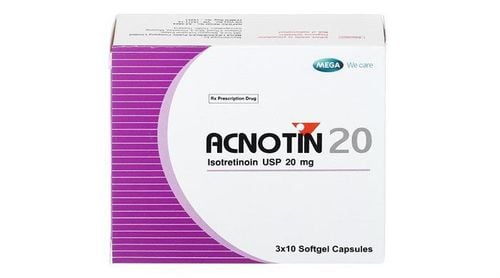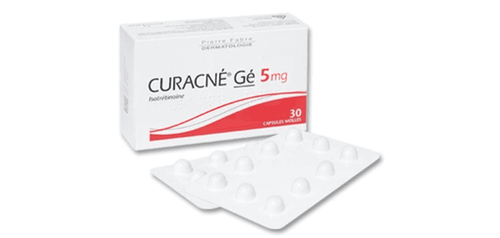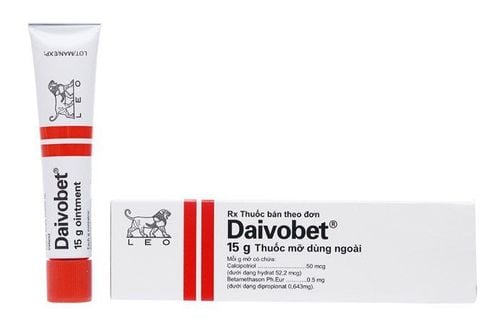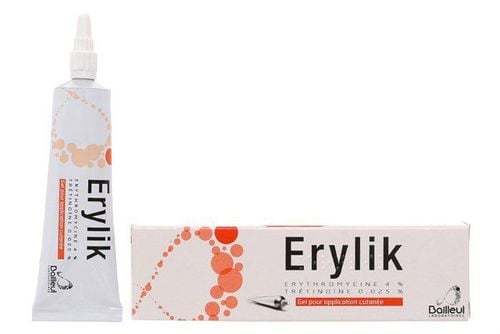Among all dermatological acne treatment methods, the oral administration of isotretinoin is one of the most satisfactory approaches for the majority of users. Prior to treatment, patients suffering from severe acne often feel significantly more confident in their smoother skin upon completion of therapy. The effectiveness achieved is largely due to the post-treatment skin care regimen following isotretinoin use, which must be adhered to rigorously under the supervision of a dermatology specialist.
1. What is Isotretinoin?
Isotretinoin is a retinoid derived from vitamin A and is the only drug used to treat severe acne that can result in significant reduction of acne lesions. When administered at the correct dosage within an appropriate treatment duration, isotretinoin can improve acne conditions by approximately 85%, potentially resulting in permanent resolution. However, adherence to the dosing regimen is crucial, as noncompliance can lead to a 15% chance of recurrence.
Additionally, isotretinoin is indicated for more severe forms of acne, particularly those that result in scarring. It is also prescribed for patients who have failed other therapeutic options including hormonal treatments or antibiotics. Consequently, in these cases, the duration of isotretinoin therapy may extend to 6-8 months.
Although isotretinoin is a potent acne treatment when prescribed by an experienced dermatology specialist, it is considered safe. Routine blood tests are necessary prior to and during treatment. Furthermore, it is imperative for patients to have regular follow-up appointments with their physician throughout the treatment course
2. How Long Do the Side Effects of Isotretinoin Last?
Potential side effects of isotretinoin include increased sensitivity to sunlight, muscle pain, and discomfort during vigorous physical activities. Additionally, patients may experience an initial exacerbation of acne upon commencing treatment, though this typically subsides after approximately six weeks.
The aforementioned adverse effects generally improve promptly following the cessation of isotretinoin. However, the drug remains in the body for up to one month post-discontinuation. Therefore, it is important to note that acne may recur for a period after treatment has ended.
For women of childbearing potential, it is essential to continue using two forms of contraception for one month after discontinuing isotretinoin. If pregnancy occurs while isotretinoin is still present in the system, there is a heightened risk of the infant being born with severe congenital anomalies, including an increased risk of miscarriage.
3. Post-Isotretinoin Skin Care Regimen
Given that the mechanism of action for isotretinoin involves reducing sebaceous gland production of sebum by approximately 80%, skin will be oily prior to treatment, but may become dry and prone to cracking and peeling during therapy.
Thus, it is critical to modify skin care practices following isotretinoin therapy and to transition from products designed for oily skin to those intended for dry skin. As the skin becomes more sensitive and dry, users should employ specialized products to hydrate and support the skin barrier throughout the isotretinoin treatment period.
Specifically, clinicians often recommend a gentle, non-foaming cream cleanser, a daytime and nighttime moisturizer with heightened humectant properties, lip balm, and broad-spectrum sunscreen. In essence, users require products similar to those formulated for dry, sensitive skin during this treatment phase. Concurrently, it is advisable for users to avoid topical retinoids, toners, or exfoliants, as these may further exacerbate dryness and cause significant irritation.
Upon completion of the treatment regimen, the skin will be entirely cleared of active lesions. However, residual acne scars or post-inflammatory hyperpigmentation may persist following isotretinoin treatment. After discontinuation of the medication, the skin will require approximately 30 days to eliminate the drug from the bloodstream, and following this period, the skin will exhibit characteristics more akin to normal or combination skin rather than the initial oily condition.
4. Will acne scars fade after the completion of treatment with isotretinoin?
No treatment method can completely eliminate acne scars. Fortunately, prominent red scars tend to fade gradually over time. Additionally, raised scars can often be resolved simply by massaging them for 10 minutes each day.
When considering any treatment for acne scars, it is crucial to have a thorough understanding of the process and the underlying mechanisms, as procedures such as chemical peels, laser treatments, or dermabrasion carry the risk of recurrent scarring. Therefore, it is essential to have a comprehensive consultation regarding these treatment options with a dermatologist prior to making a decision.

In summary, the skin is usually very oily before initiating isotretinoin therapy and becomes very dry during the course of treatment. Consequently, the skincare regimen following the isotretinoin therapy should transition from typical to combination skin care 30 days after discontinuation. Furthermore, to achieve optimal skincare results, individuals should also avoid sun exposure, refrain from alcohol consumption, and attend regular follow-up appointments with a dermatologist during the post-acne treatment monitoring phase.
For consultation and examination at Vinmec hospitals nationwide, interested parties are encouraged to schedule an appointment via the website (vinmec.com) for assistance.
References: aad.org, nhs.uk, publicdocuments.sth.nhs.uk, dermastore.co.za
To arrange an appointment, please call HOTLINE or make your reservation directly HERE. You may also download the MyVinmec app to schedule appointments faster and manage your reservations more conveniently.
To arrange an appointment, please call HOTLINE or make your reservation directly HERE. You may also download the MyVinmec app to schedule appointments faster and manage your reservations more conveniently.








